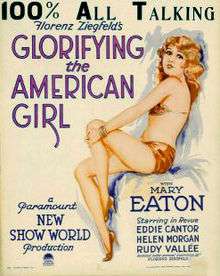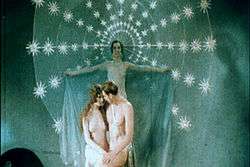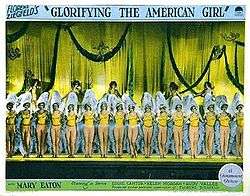Glorifying the American Girl
| Glorifying the American Girl | |
|---|---|
 | |
| Directed by |
John W. Harkrider Millard Webb |
| Produced by | Florenz Ziegfeld |
| Written by |
J.P. McEvoy (story) Millard Webb |
| Starring |
Mary Eaton Dan Healy |
| Music by |
Irving Berlin Walter Donaldson Rudolf Friml James E. Hanley |
| Cinematography | George J. Folsey (Technicolor) |
| Distributed by | Paramount Pictures |
Release dates | December 7, 1929 |
Running time | 96 minutes |
| Country | United States |
| Language | English |
Glorifying the American Girl is a 1929 American Pre-Code, musical comedy film produced by Florenz Ziegfeld that highlights Ziegfeld Follies performers. The last third of the film (which was filmed in early Technicolor) is basically a Follies production, with cameo appearances by Rudy Vallee, Helen Morgan, and Eddie Cantor.
Rex Beach was paid $35,000 for the original story.[1][2]
The script for the film was written by J.P. McEvoy and Millard Webb and directed by John W. Harkrider and Millard Webb. The songs were written by Irving Berlin, Walter Donaldson, Rudolf Friml, James E. Hanley, Larry Spier and Dave Stamper. The film is in the public domain, and many prints exhibited on television are in black-and-white only, and do not include pre-Code material, such as nudity.
Plot

The plot involves a young woman (Mary Eaton) who wants to be in the Follies, but in the meantime is making ends meet by working at a department store's sheet music department, where she sings the latest hits. She is accompanied on piano by her childhood boyfriend (Edward Crandall), who is in love with her, despite her single-minded interest in her career. When a vaudeville performer (Dan Healy) asks her to join him as his new partner, she sees it as an opportunity to make her dream come true. Upon arriving in New York City, our heroine finds out that her new partner is only interested in sleeping with her and makes this a condition of making her a star. Soon, however, she is discovered by a representative of Ziegfeld.
Cast
- Mary Eaton as Gloria Hughes
- Dan Healy as Danny Miller
- Kaye Renard as Mooney
- Edward Crandall as Buddy Moore
- Gloria Shea as Barbara (billed as Olive Shea)
- Sarah Edwards as Mrs. Hughes
Cameo appearances
Production
- This Pre-Code movie is notable for being the first talkie to use the word "damn" (that credit usually goes to either Pygmalion or Gone with the Wind). The word is used on at least one occasion by Sarah Edwards as well as multiple times in the skit involving Eddie Cantor, Louis Sorin and Lew Hearn. (The word was also used twice in the movie Coquette, released in April of the same year.)
- The revue sequence contains virtual nudity and revealing costumes.
- Both Paramount and EMKA failed to renew the copyright and the film is now in the public domain. EMKA's successor, Universal Studios, continues to hold the original film elements; though technically the EMKA library is part of NBC Universal Television, successor to Universal Television and MCA Television (EMKA was a subsidiary of MCA).
Preservation

The black-and-white prints currently shown on television, with a cut-down running time of 87 minutes, were made in the 1950s and have a number of sequences cut due to their Pre-Code content, i.e. nudity, etc. The film was restored, to the length of 96 minutes, with the original Technicolor sequences, by the UCLA Film and Television Archive.[3]
Miscellany
- The movie contains brief shots of Noah Beery, Irving Berlin, Billie Burke, Charles B. Dillingham, Texas Guinan, Otto Kahn, Ring Lardner and Mayor of New York City Jimmy Walker as themselves.
- There is an uncredited, non-speaking scene with Johnny Weissmuller wearing nothing but a fig leaf.
- The greater part of the final half of the film is a revue given over to a re-creation of a Follies production, replete with musical solos by Rudy Vallee and Helen Morgan and a comedy sketch with Eddie Cantor and Louis Sorin as a pair of Jewish tailors.
Soundtrack
The film begins with a medley of hits from Ziegfeld productions, including "Tulip Time", "A Pretty Girl Is Like a Melody", "Sally, Won't You Come Back?", and "No Foolin'." The band at the picnic plays "Bye Bye Blackbird" and "Side by Side."
- "No Foolin'"
- Music by Rudolf Friml and James F. Hanley
- Lyrics by Gene Buck and Irving Caesar
- Sung by Mary Eaton
- "Baby Face"
- Music by Harry Akst
- Lyrics by Benny Davis
- Sung by Mary Eaton
- "I'll Be There"
- Music by Larry Spier, J. Fred Coots, and Lou Davis
- Sung by Mary Eaton and played on the piano several times by Edward Crandall
- "Spooning with the One You Love"
- Performed by Dan Healy and Kaye Renard
- Music by Irving Berlin
- Played by a band while the acrobats are performing
- "Sam, the Old Accordion Man"
- Music by Walter Donaldson
- Danced to by Dan Healy and Mary Eaton at the picnic and later onstage
- "Hot Feet"
- Music by Jimmy McHugh
- Danced to by Dan Healy and Mary Eaton
- "I'm Just a Vagabond Lover"
- Music by Rudy Vallée and Leon Zimmerman
- Performed by Rudy Vallée and His Connecticut Yankees
- "What Wouldn't I Do for That Man?"
- Music by Jay Gorney
- Lyrics by E.Y. Harburg
- Performed by Helen Morgan
- "There Must Be Somebody Waiting For Me"
- Music by Walter Donaldson
- Performed by Mary Eaton and chorus in the finale. Played by pianist while Eaton dances en pointe. Played during opening credits.
See also
References
- ↑ Beach, Rex (1940). Personal Exposures. New York: Harper & Brothers. p. 205.
- ↑ H.J. (January 7, 1950). "Miner and Novelist". The Age. Retrieved August 1, 2015.
- ↑ Feature films preserved by UCLA (1977-2012)
External links
| Wikimedia Commons has media related to Glorifying the American Girl. |
- Glorifying the American Girl at the Internet Movie Database
- Glorifying the American Girl at the TCM Movie Database
- Glorifying the American Girl at AllMovie
- Glorifying the American Girl is available for free download at the Internet Archive (censored version)